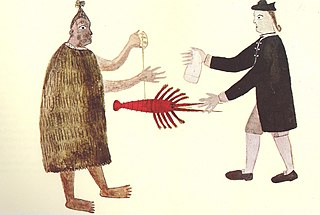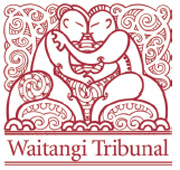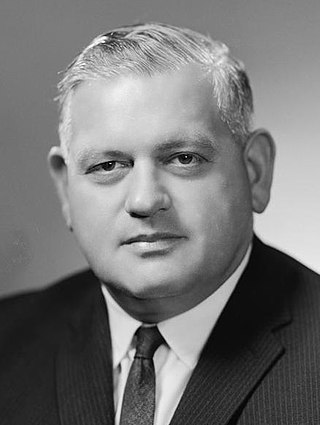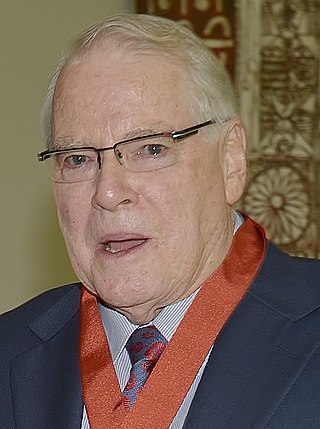
The Treaty of Waitangi, sometimes referred to as Te Tiriti, is a document of central importance to the history of New Zealand, its constitution, and its national mythos. It has played a major role in the treatment of the Māori people in New Zealand by successive governments and the wider population, something that has been especially prominent from the late 20th century. The treaty document is an agreement, not a treaty as recognised in international law, and has no independent legal status, being legally effective only to the extent it is recognised in various statutes. It was first signed on 6 February 1840 by Captain William Hobson as consul for the British Crown and by Māori chiefs from the North Island of New Zealand.
Rātana is a Māori Christian church and movement, headquartered at Rātana Pā near Whanganui, New Zealand. The Rātana movement began in 1918, when Tahupōtiki Wiremu Ratana experienced visions, and began a mission of faith healing. In 1925 the Ratana Church was formed, and on 25 January 1928—T. W.'s 55th birthday, and "Rātana Day"—the church's iconic temple, Te Temepara Tapu o Ihoa was opened. From its beginning and through to the 20th century, the church has pursued political goals, and still welcomes political leaders to the Rātana Pā annually on Ratana's birthday. In the 2018 New Zealand census, 43,821 people identified with the religion.

Waitangi Day, the national day of New Zealand, marks the anniversary of the initial signing—on 6 February 1840—of the Treaty of Waitangi. The Treaty of Waitangi was an agreement towards British sovereignty by representatives of the Crown and indigenous Māori chiefs, and so is regarded by many as the founding document of the nation.

The Waitangi Tribunal is a New Zealand permanent commission of inquiry established under the Treaty of Waitangi Act 1975. It is charged with investigating and making recommendations on claims brought by Māori relating to actions or omissions of the Crown, in the period largely since 1840, that breach the promises made in the Treaty of Waitangi. The Tribunal is not a court of law; therefore, the Tribunal's recommendations and findings are not binding on the Crown. They are sometimes not acted on, for instance in the foreshore and seabed dispute.

Norman Eric Kirk was a New Zealand politician who served as the 29th prime minister of New Zealand from 1972 until his sudden death in 1974.

Sir Wallace Edward Rowling, commonly known as Bill Rowling, was a New Zealand politician who was the 30th prime minister of New Zealand from 1974 to 1975. He held office as the leader of the Labour Party.

Māori politics is the politics of the Māori people, who were the original inhabitants of New Zealand and who are now the country's largest minority.

The Minister for Māori Development is the minister in the New Zealand Government with broad responsibility for government policy towards Māori, the first inhabitants of New Zealand. The Minister heads the Te Puni Kōkiri. Between 1947 and 2014 the position was called Minister of Māori Affairs; before that it was known as Minister of Native Affairs. The current Minister for Māori Development is Tama Potaka.
Ohu is a Māori word meaning 'communal work group'. A number of ohu were set up in rural areas of New Zealand under a government scheme established in the mid-1970s.
Claims and settlements under the Treaty of Waitangi have been a significant feature of New Zealand politics since the Treaty of Waitangi Act 1975 and the Waitangi Tribunal that was established by that act to hear claims. Successive governments have increasingly provided formal legal and political opportunity for Māori to seek redress for what are seen as breaches by the Crown of guarantees set out in the Treaty of Waitangi. While it has resulted in putting to rest a number of significant longstanding grievances, the process has been subject to criticisms including those who believe that the redress is insufficient to compensate for Māori losses. The settlements are typically seen as part of a broader Māori Renaissance.

Matiu Waitai Rata was a Māori politician who was a member of the New Zealand Parliament for the Labour Party from 1963 to 1980, and a cabinet minister from 1972 to 1975. In 1979 he resigned from the Labour Party and formed the Mana Motuhake Party.

Tāpihana Paraire "Dobbie" Paikea, also known as Dobson, was a New Zealand politician and Rātana morehu who won the Northern Maori electorate for Labour in 1943. He was a Māori of Te Roroa, Te Parawhau and Ngāti Whātua descent. He was elected following the death of his father Paraire Karaka Paikea who had been the MP, and he held the parliamentary seat until his own death in 1963.

Michael Edward Rainton Bassett is a former Labour Party member of the New Zealand House of Representatives and cabinet minister in the reformist fourth Labour government. He is also a noted New Zealand historian, and has published a number of books on New Zealand politics, including biographies of Prime Ministers Peter Fraser, Gordon Coates and Joseph Ward.

There have been two Waitangi Day acts passed by the New Zealand Parliament: the Waitangi Day Act 1960 and the Waitangi Day Act 1976. Neither made 6 February a public holiday; this was done by the New Zealand Day Act 1973. The first Waitangi Day act acknowledged the Treaty of Waitangi. The second changed the name of the day from New Zealand Day back to Waitangi Day.

The Treaty of Waitangi Act 1975 gave the Treaty of Waitangi recognition in New Zealand law for the first time and established the Waitangi Tribunal. The tribunal was empowered to investigate possible breaches of the Principles of the Treaty of Waitangi by the New Zealand Government or any state-controlled body, occurring after 1975. It was also empowered to recommend, but not enforce, remedies.

The Third Labour Government of New Zealand was the government of New Zealand from 1972 to 1975. During its time in office, it carried out a wide range of reforms in areas such as overseas trade, farming, public works, energy generation, local government, health, the arts, sport and recreation, regional development, environmental protection, education, housing, and social welfare. Māori also benefited from revisions to the laws relating to land, together with a significant increase in a Māori and Island Affairs building programme. In addition, the government encouraged biculturalism and a sense of New Zealand identity. However, the government damaged relations between Pākehā and Pasifika New Zealanders by instituting the Dawn Raids on alleged overstayers from the Pacific Islands; the raids have been described as "the most blatantly racist attack on Pacific peoples by the New Zealand government in New Zealand’s history". The government lasted for one term before being defeated a year after the death of its popular leader, Norman Kirk.

The Second National Government of New Zealand was the government of New Zealand from 1960 to 1972. It was a conservative government which sought mainly to preserve the economic prosperity and general stability of the early 1960s. It was one of New Zealand's longest-serving governments.
The Māori protest movement is a broad indigenous rights movement in New Zealand. While there was a range of conflicts between Māori and European immigrants prior to the signing of the Treaty of Waitangi in 1840, the signing provided one reason for protesting. Disagreements in the decades following the signing sometimes included war.
The law of New Zealand uses the English common law system, inherited from being a part of the British Empire.

The political history of New Zealand covers political events and trends related to the history of New Zealand, from the precolonial to the contemporary period, including significant milestones such as the attainment of self-government, transition to Dominion status, and ultimately, independence.












